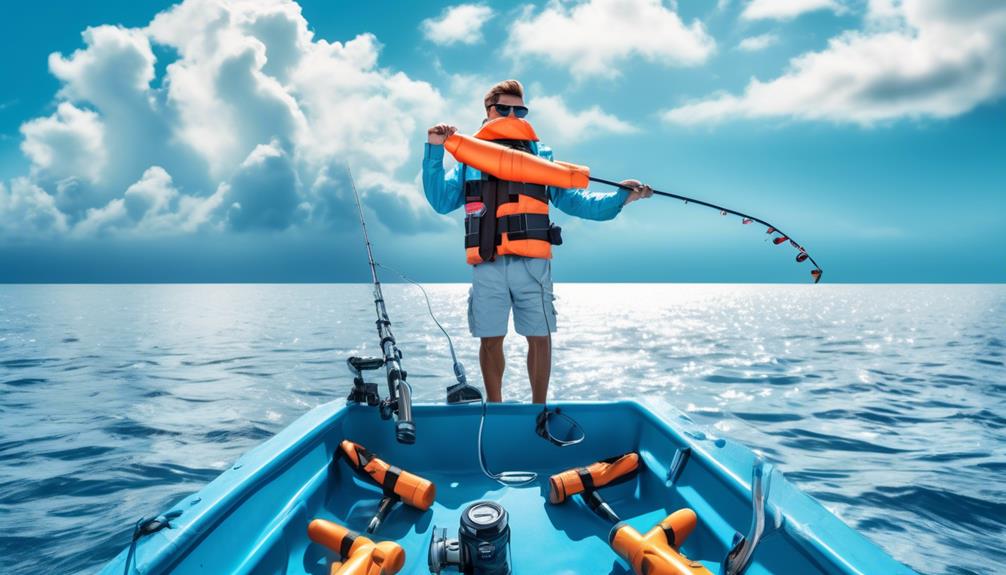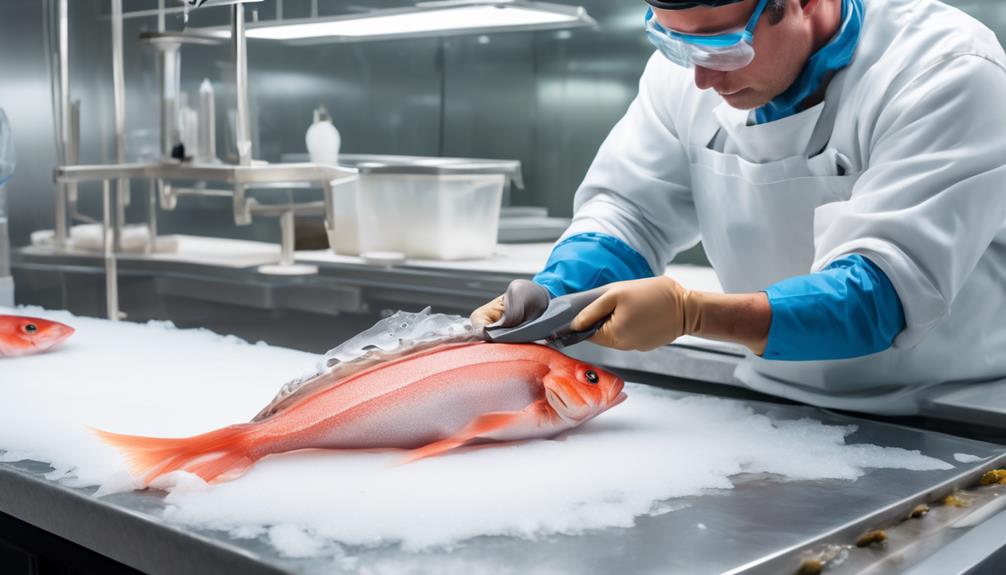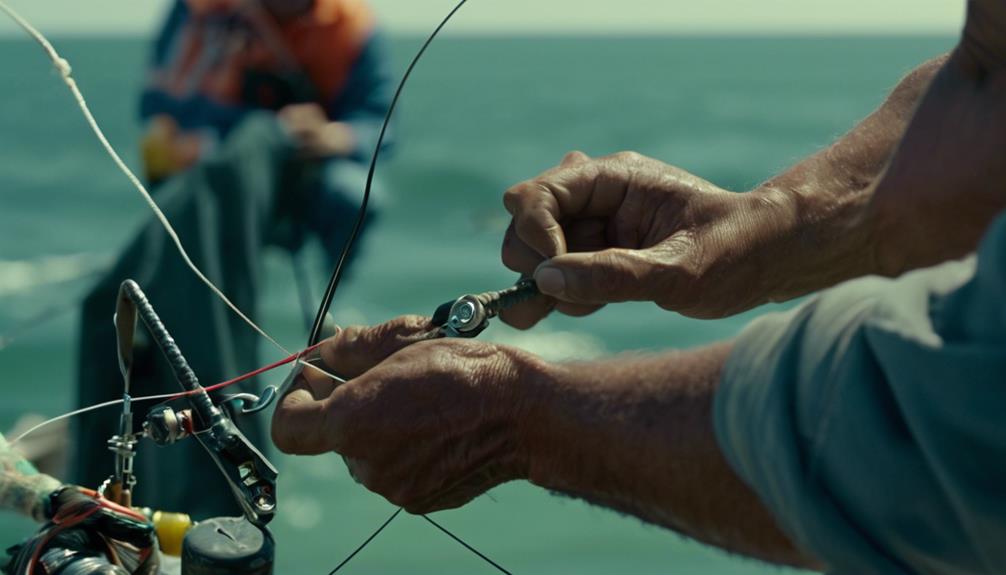Navigating the waters of saltwater fishing can be like charting a course through life's uncertainties. As you cast your line into the depths, it's essential to ensure your safety and well-being.
From understanding the ever-changing weather conditions to handling sharp tools, there are several crucial safety tips to keep in mind.
By the end of this discussion, you'll have a comprehensive understanding of the best practices to stay safe and secure while embarking on your saltwater fishing adventures.
Proper Gear and Equipment
When saltwater fishing, ensure you have the proper gear and equipment to enhance your fishing experience and increase your chances of success. Start with a reliable rod and reel. Your rod should be sturdy enough to handle the size of fish you expect to catch, and the reel should be appropriate for saltwater use to prevent corrosion. A good quality rod and reel can make a significant difference in your fishing efficiency and enjoyment.
In addition to the rod and reel, a well-organized tackle box is essential for saltwater fishing. Make sure your tackle box is stocked with a variety of lures, hooks, sinkers, and other essential items. It's important to have a selection of lures that mimic the baitfish and other prey species in the area where you plan to fish. This will increase your chances of attracting the attention of the fish you're targeting. Additionally, having a range of hook sizes and styles can be beneficial for adapting to different fishing conditions and species.
Furthermore, don't forget to include a pair of needle-nose pliers in your tackle box. These can be incredibly useful for removing hooks, flattening barbs, and handling small fish. A good pair of pliers can make your fishing experience more efficient and ensure that you can safely handle your catch.
Understanding Weather Conditions
To ensure a safe and successful saltwater fishing trip, understanding weather conditions is crucial for planning your outing and maximizing your chances of a good catch. When it comes to weather patterns, being aware of upcoming conditions is essential for your safety and the success of your fishing experience. Here are some key points to consider:
- Weather Patterns
- Keeping an eye on weather forecasts before heading out is vital. Look for any signs of approaching storms, strong winds, or foggy conditions that could pose risks to your safety. Be prepared to postpone your trip if severe weather is predicted.
- Understanding the typical weather patterns of the area you'll be fishing in is also important. Coastal regions may have different weather behaviors compared to inland areas. Familiarize yourself with the seasonal changes and how they can affect your fishing excursion.
- Safety Measures
- Pay attention to any weather warnings or advisories issued by local authorities. Ignoring these alerts can lead to dangerous situations on the water.
- Always have a backup plan in case the weather takes a turn for the worse. Knowing alternative shelter locations or having the means to communicate for help is crucial.
Understanding wind and waves is also critical for your safety and fishing success. By comprehending how wind direction and intensity can affect water currents and the behavior of fish, you can make informed decisions about where to fish and how to navigate the waters. Similarly, being knowledgeable about wave patterns and their impact on your boat or fishing location will help you stay safe and adapt your fishing techniques accordingly.
Boat Safety Measures
Ensure your boat is equipped with essential safety gear before heading out for your saltwater fishing trip. It's crucial to comply with life jacket requirements and boating regulations to ensure the safety of everyone on board. Make sure you have enough life jackets for every passenger and that they're easily accessible. Check the regulations specific to your location, as they might've different requirements for children or specific types of vessels.
Additionally, ensure your boat is equipped with proper navigation lights for nighttime or low-visibility conditions. These lights are essential for making your vessel visible to other boats and for understanding the position and direction of other vessels.
Communication devices are also vital for boat safety. A reliable means of communication, such as a VHF radio or a cell phone with a signal booster, can be a lifesaver in case of an emergency. Familiarize yourself with how to use these devices and ensure they're in good working condition before setting out.
It's also a good idea to have a sound signaling device on board, such as a whistle or horn, to alert other vessels in case of an emergency.
Handling Sharp Hooks and Tools
Before handling sharp hooks and tools, make sure to secure them in a designated storage area on your boat, ensuring they're out of reach and properly stored to prevent accidents.
When dealing with sharp hooks and tools, safety should always be a top priority. Here are some essential tips to keep in mind:
- Hook Removal and First Aid
- Use long-nose pliers or a hook remover tool to safely remove hooks from fish or yourself. This reduces the risk of injury and allows for a quick and efficient extraction.
- In the event of a hook-related injury, have a well-stocked first aid kit on board. Clean the wound thoroughly and apply antiseptic to prevent infection. Seek medical attention if the injury is severe.
- Tool Maintenance and Handling
- Regularly inspect hooks and tools for any signs of damage or rust. Replace or repair them as needed to ensure they remain in good working condition.
- When not in use, store tools in a secure and organized manner to prevent them from causing accidental injuries. Keep them in a designated tool kit or storage compartment to minimize the risk of mishaps.
Knowing Emergency Protocols
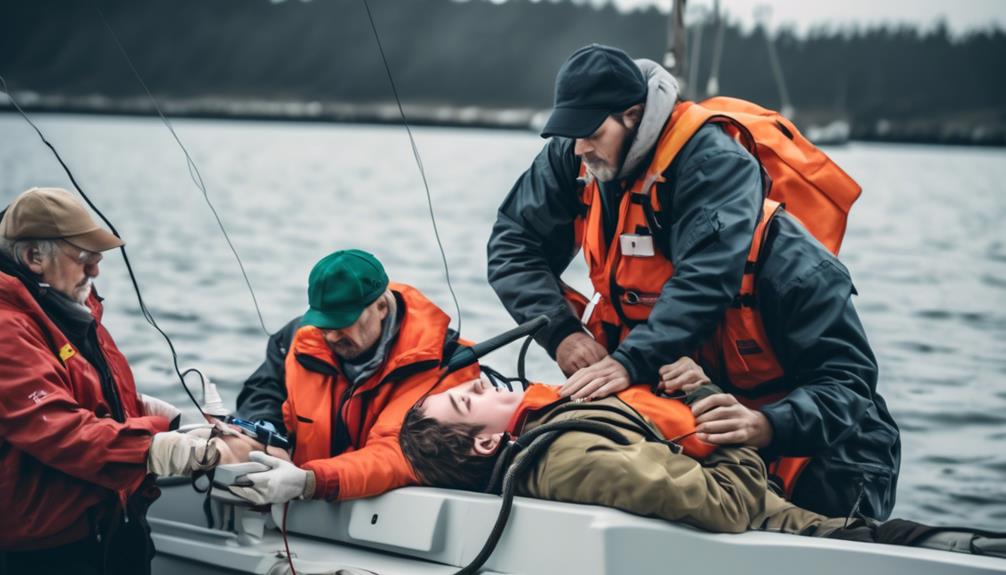
In case of emergencies while saltwater fishing, familiarize yourself with the proper protocols for handling unexpected situations on the water. Emergency response is crucial, so consider obtaining first aid training to be prepared for any medical emergencies that may arise. It's also important to familiarize yourself with communication protocols, ensuring that you know how to call for help and relay important information in case of an emergency.
Additionally, always ensure that your boat is equipped with emergency equipment, such as a first aid kit, life jackets, fire extinguisher, and distress signals like flares or an emergency whistle.
Before heading out for a fishing trip, make sure to have emergency contact information readily available. This should include the contact details of the local coast guard or marine rescue services, as well as someone who can be reached in case of an emergency on land. It's important to have this information easily accessible in case of any unforeseen events.
Being prepared for emergencies is critical for ensuring the safety of everyone on board. By taking the time to familiarize yourself with emergency protocols, obtaining necessary training, and ensuring the availability of emergency equipment, you can be better equipped to handle unexpected situations while saltwater fishing.
Sun Protection and Hydration
Remember to protect yourself from the sun's rays and stay hydrated while out on the water for a safe and enjoyable saltwater fishing experience. Sun protection and hydration are crucial for your well-being during extended periods outdoors. Here are some important tips to keep in mind:
- Protective Clothing and Sunscreen
- Wear lightweight, long-sleeved shirts, pants, and wide-brimmed hats to shield your skin from direct sunlight.
- Apply a broad-spectrum sunscreen with a high SPF rating to all exposed areas of skin, and remember to reapply it every two hours, or more often if you're sweating or in the water.
- Water Intake and Electrolyte Balance
- Drink plenty of water throughout the day to stay hydrated, especially when exposed to the sun and salty sea air. Dehydration can sneak up on you, so it's essential to drink water even if you don't feel thirsty.
- Maintain electrolyte balance by consuming drinks or snacks that contain essential electrolytes, especially if you're sweating profusely. Electrolyte imbalances can lead to muscle cramps and fatigue, so it's important to replenish these vital minerals.
Watching Out for Wildlife
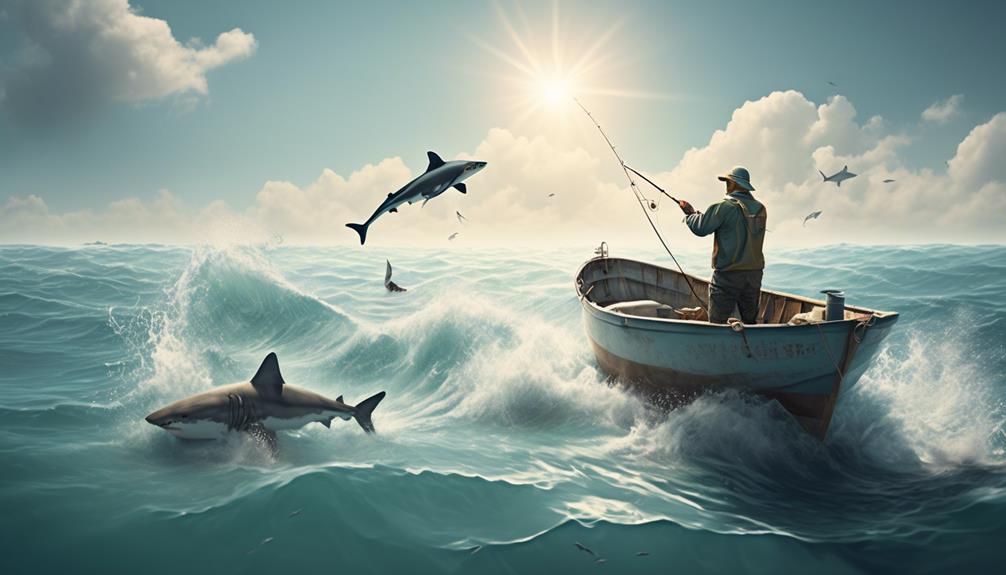
When fishing in saltwater, always be aware of the surrounding wildlife to ensure your safety and the well-being of the marine animals. Wildlife encounters are common while fishing in saltwater, so taking safety precautions is essential. It's crucial to be mindful of marine animal behavior and take cautionary measures to avoid any potential dangers.
Firstly, always keep a safe distance from marine animals. While it can be tempting to get close for a better look or a photo, it's important to remember that these are wild animals and may react unpredictably if they feel threatened. Maintain a respectful distance to avoid any potential wildlife encounters that could result in harm to you or the animals.
Secondly, be cautious when handling your catch. Some species of fish have sharp teeth, spines, or other defense mechanisms that can cause injury. Use appropriate tools, such as pliers or gloves, to handle your catch safely and minimize harm to both yourself and the fish.
Additionally, be mindful of your waste and litter. Dispose of any trash or fishing line properly to prevent marine animals from getting entangled or ingesting harmful materials. By being responsible and considerate of the wildlife around you, you can help protect both yourself and the marine ecosystem.
Being Mindful of Tides and Currents
Always consider the impact of tides and currents on your fishing experience to ensure your safety and success. Being mindful of tidal changes and water currents is crucial for a fruitful and safe saltwater fishing trip.
- Understanding Fishing Techniques:
When fishing in areas with strong currents, consider using techniques such as drift fishing or bottom bouncing, which can be more effective in such conditions. These techniques allow you to work with the current rather than against it, increasing your chances of a successful catch.
- Taking Safety Precautions:
Before heading out, check tidal charts and current forecasts for the area where you plan to fish. Understanding the timing and intensity of tides and currents can help you avoid potentially dangerous situations. It's important to be aware of how these factors can impact the water depth and speed, which may affect your ability to navigate and fish safely.
In addition to enhancing your fishing techniques, being mindful of tides and currents contributes to your overall safety. Ignoring these factors can lead to unexpected challenges and even pose risks to your well-being. By staying informed and adapting your approach accordingly, you can make the most of your saltwater fishing experience while prioritizing your safety.
Frequently Asked Questions
What Are the Best Practices for Safely Handling and Releasing Fish to Minimize Harm to Them?
When handling fish, use ethical fishing practices and proper handling techniques to minimize harm. Be gentle when handling and releasing fish to protect them from unnecessary harm and ensure their survival after being caught.
How Can I Avoid Getting Tangled in Fishing Lines and Other Gear While Out on the Water?
When out on the water, avoid getting tangled in fishing lines and gear by practicing untangling techniques and keeping your gear organized. Stay aware of your surroundings and be proactive in preventing tangles.
Are There Any Specific First Aid Tips for Treating Common Injuries That May Occur While Saltwater Fishing?
When saltwater fishing, it's important to know first aid for injuries. Treat cuts with clean water and bandages. For fish handling, carry pliers for hook removal. If seasick, focus on the horizon. In case of shark encounter, stay calm and slowly back away.
What Should I Do if I Encounter a Shark or Other Potentially Dangerous Marine Animal While Fishing?
If you encounter a shark or other dangerous marine animal while fishing, stay calm and slowly back away. Avoid sudden movements to prevent attracting attention. When handling catch, use proper techniques for safe catch and release.
How Can I Prevent Seasickness While Out on a Saltwater Fishing Trip?
To prevent seasickness while saltwater fishing, try motion sickness remedies like ginger or medication. Also, keep an eye on weather safety precautions, such as checking the forecast and avoiding rough seas to minimize the risk of motion sickness.
Conclusion
So, remember to always prioritize safety when heading out for a saltwater fishing adventure.
Make sure to have the proper gear, understand weather conditions, practice boat safety, handle sharp tools carefully, know emergency protocols, protect yourself from the sun and stay hydrated.
Watch out for wildlife and be mindful of tides and currents.
By following these tips, you can enjoy your fishing trip while staying safe and prepared for any situation.
